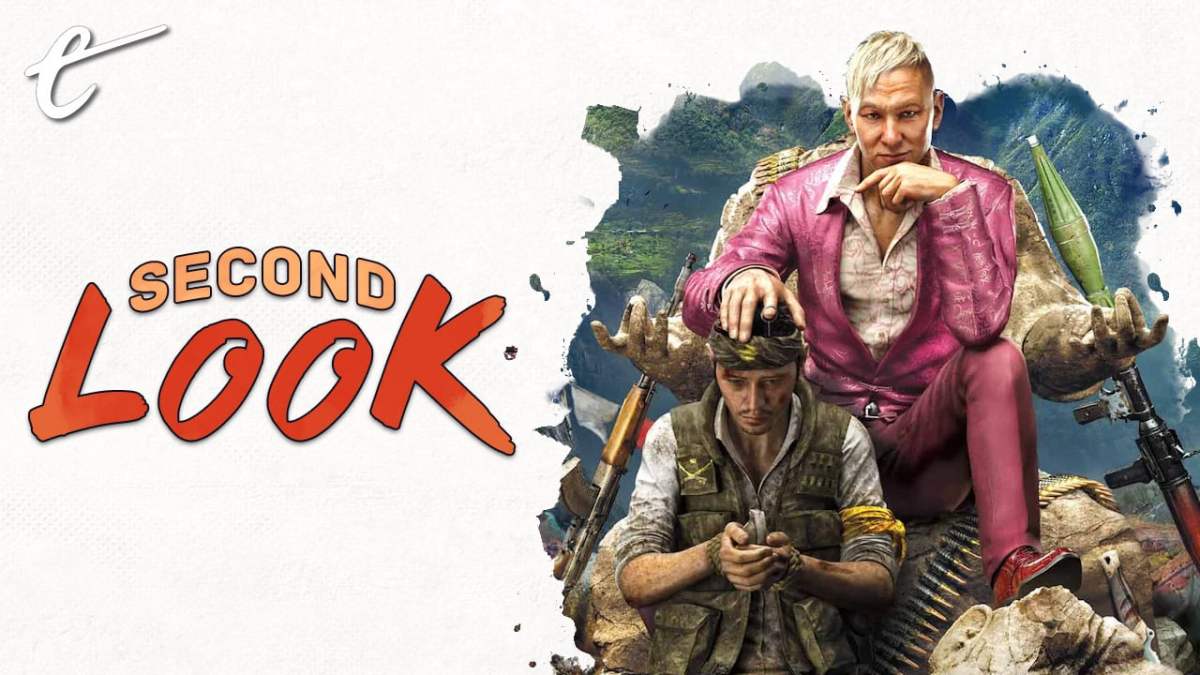We’re well into the first months of the 9th console generation, and with it the closing years of the PlayStation 4 and Xbox One. Many studios have had impressive highs and terrifyingly bleak lows, with few boasting as many of each as Ubisoft. Assassin’s Creed is practically unrecognizable. Rainbow Six Siege was almost a dud, only to turn itself around into a hit. The Tom Clancy brand tried to somehow take military fiction and not be political. Yet out of all Ubisoft’s many hits and misses, none quite compares to Far Cry 4.
In many ways, Far Cry 4 is the prototypical Ubisoft game. It stars a relatively blank-slate male lead, Ajay Ghale, returning to his fictional home country of Kyrat after spending his whole adult life as an American. It’s obsessed with search towers and sandbox gameplay. It’s also intensely political without overtly stating a conservative or liberal worldview. So far, so standard. What’s key to Far Cry 4’s success though is that it uses these familiar elements to elevate its strong points rather than relying on them to compensate for personality. While far from a perfect game, Far Cry 4 might just be the perfect Ubisoft game.
It’s stunning just how effectively Far Cry 4 balances subtlety amid a hailfire of explosions. This is a game where you can fire a handheld grenade launcher while charging into an enemy camp with a war elephant as a friend flies in via a gyrocopter in co-op. Yet somehow, it’s equally a game where you can skip the entire conflict by being patient, discovering a secret ending that turns the entire game into a brilliant 10-minute short story about an Americanized immigrant coming to his home country for the first time. That’s amazing in and of itself, but rather than a one-off Easter egg, this dedication to telling Ajay and antagonist Pagan Min’s mutual journey drives the core of the journey.
To be perfectly clear, Far Cry 4 is without a doubt mechanically identical to Far Cry 3, if a tad tighter. It’s open-world and packed with fascists to shoot, animals to hunt, quirky sidequests to partake in, and a wacky main villain in the form of Troy Baker’s Pagan Min. There are some over-the-top lieutenants of Min’s to take down, slapstick sidequests, and two rival revolutionaries you can choose to support at various points in the story. However, where Far Cry 3 was all about letting out your wild side, Far Cry 4 gives you agency in how much blood you get on your hands while liberating Kyrat.
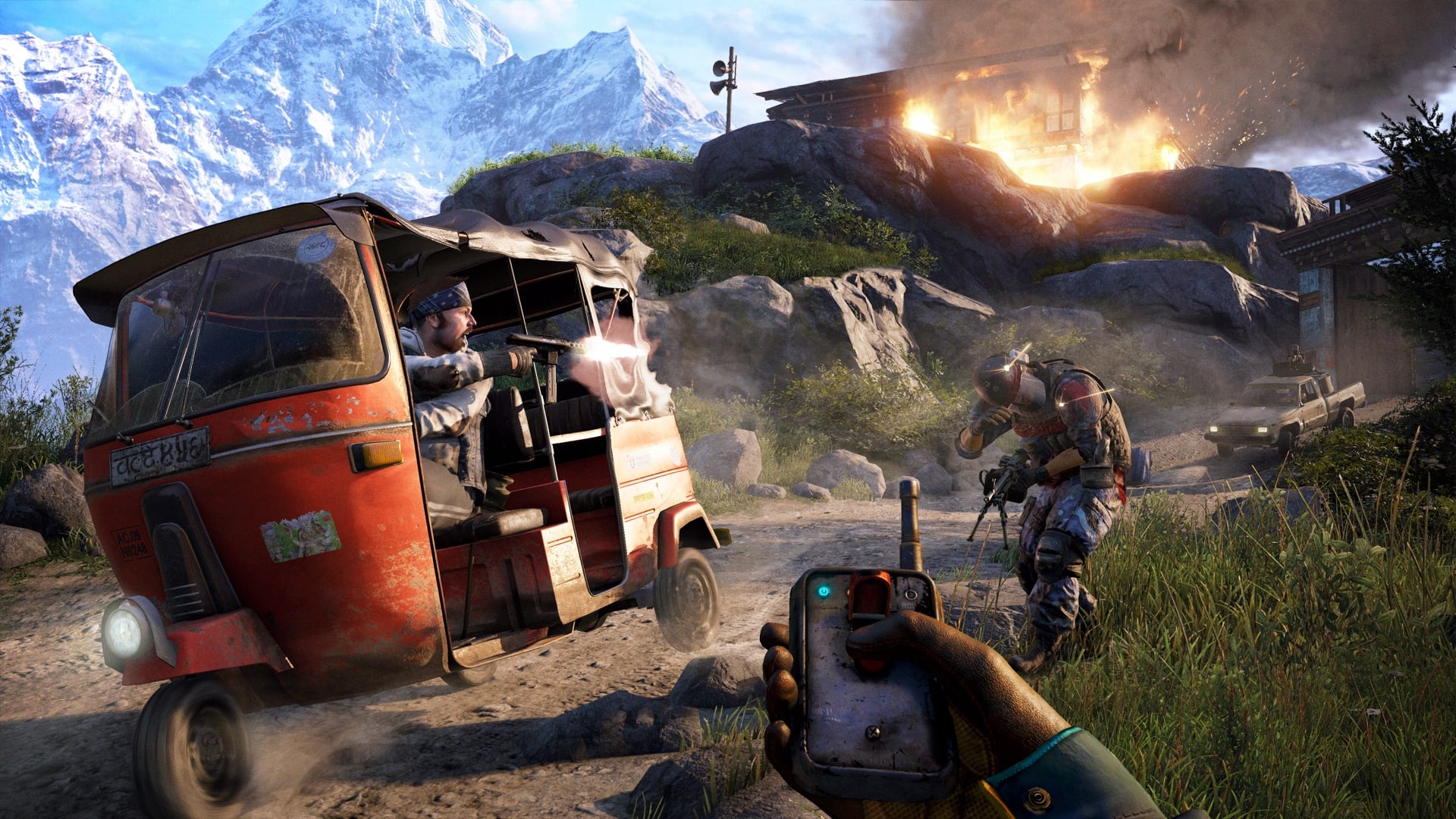
Besides the alternate early ending, you’re often allowed to choose violent or more “merciful” methods to eliminate many of Pagan’s subordinates. The ex-US military interrogator? You can spare his life, but he’ll be a prisoner of Kyrat, tortured by the ring on his phone from his daughter. The woman manipulated into running a blood sport pit fight? Sure, you could kill her, but she helps you earlier and you regrettably learn the blackmail keeping her in line is far from the truth. How she responds to the revelation, should you share it, leaves you contemplating what would’ve been the just way to resolve the conflict.
Nowhere is this ambiguity more evident than the conflict between your two closest allies, your late-father’s revolutionary subordinates Amita and Sabal. Amita is a progressive woman, interested in building up Kyrat’s women, industry, and modernization. Sabal is a fundamentalist conservative man, with a fervent faith, desire to see his nation untainted by Western influences, and an instant charisma. Each will give you different missions to pursue, with wildly different outcomes. Amita wants to capture Pagan’s opium farms to sell to pharmaceutical corporations, while Sabal wants to burn them and replace them with more traditional, legal crops. The heir apparent to Kyrat’s religious order, Bhadra, is a teenage girl treated like a game piece by the two of them. Amita seeks to teach the girl the ways of the world, while Sabal wants to protect her to retain their cultural heritage.
And in the end? Neither of them is a hero. Over time, each of them is corrupted by the power he or she wields. Amita becomes a fascist communist drug lord who it’s implied had Bhadra killed for getting in the way of her maintaining power as the new cultural figurehead. Sabal has Bhadra locked away and institutes tyrannical theocratic rules that ensure he’ll go unchallenged for years to come, free to execute anyone for heresy. In the end, there’s no objectively “good” path to take, as neither of them is truly prepared to rule.
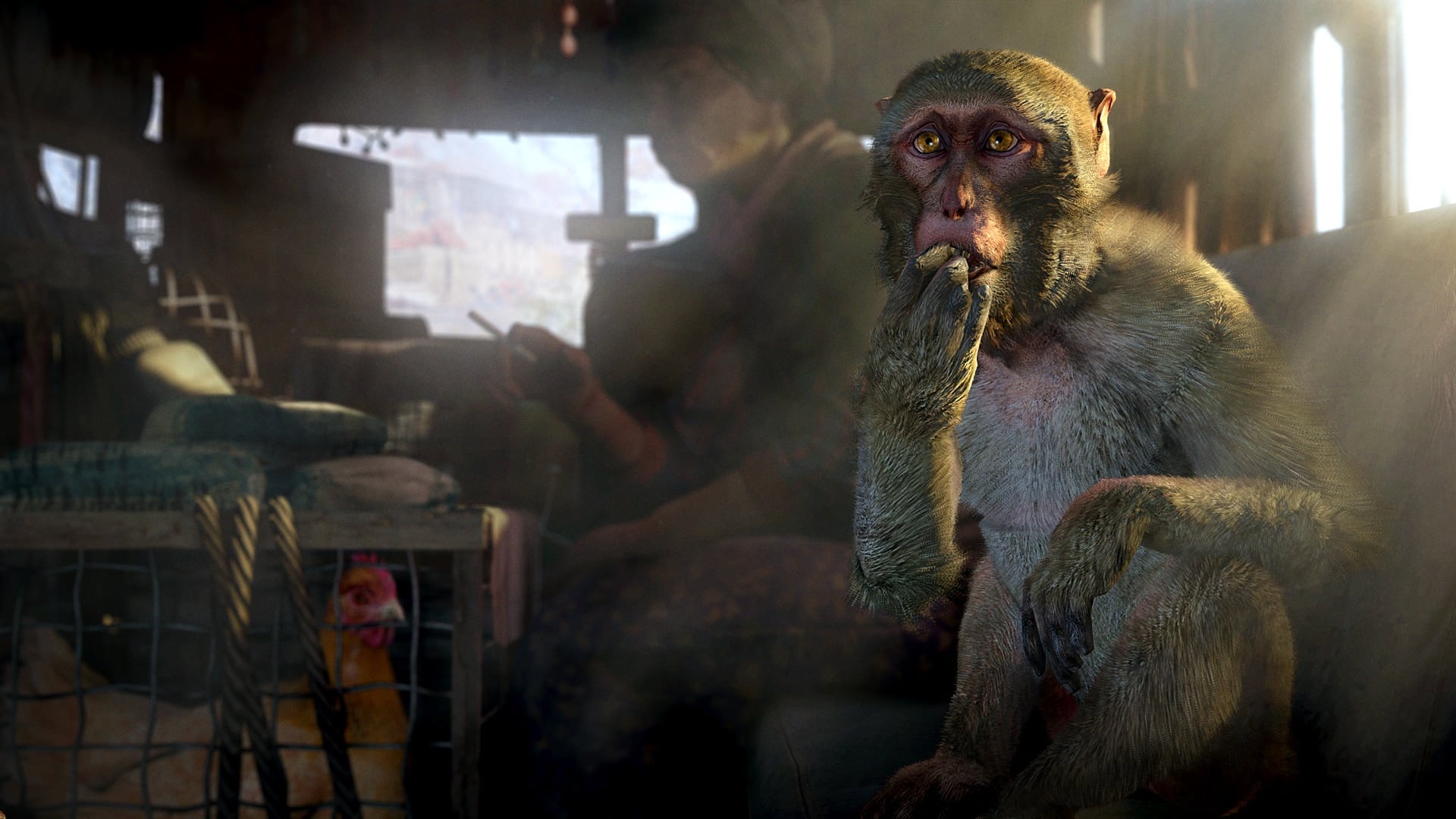
The twist is you’re ordered to kill whichever one you don’t side with by the end, but just like Pagan Min’s underlings, you can choose a different way. The person you don’t side with never becomes corrupted because they’ve had all their power stripped away. Instead, if you let them live, they’re left to a life in exile, and you can find them later on, living peacefully. There are a lot of little discoveries like this, such as Bhadra’s resting place in Amita’s ending and, in particular, the unique opportunity offered in the game’s conclusion, where you finally face down Pagan Min.
Pagan Min is a fascinating villain. While he starts off making you think he’s just an effeminate male stereotype, you learn that Pagan is completely self-aware at how absurd things have grown. He doesn’t want to rule. In fact, he and your mother fell in love, something your father took poorly, costing your infant half-sister’s life and driving Pagan over the edge. That’s why Pagan never aggressively threatens you or grows mad at you destroying all his forces. As far as he’s concerned, you’re literally just playing a game of war while he waits for you to get out your anger.
Pagan calls this out directly when you enter his house, where, like in your first meeting at the start of the game, he invites you to sit down for dinner. He nearly smashes the fourth wall to pieces, asking if you’re the man who will have a sensible chat with him or the man just interested in shooting him — which you can totally do.
In a game full of bombastic moments, Far Cry 4’s endings are remarkably low-key. Pagan doesn’t fight you with a hundred helicopters or something — you’ve destroyed his empire, and he knows it. You can end him. He has no power here. Yet if you listen, he explains all this. He tells you directly that you’re the true heir to the throne of Kyrat. All you had to do was put down your gun for a few minutes.
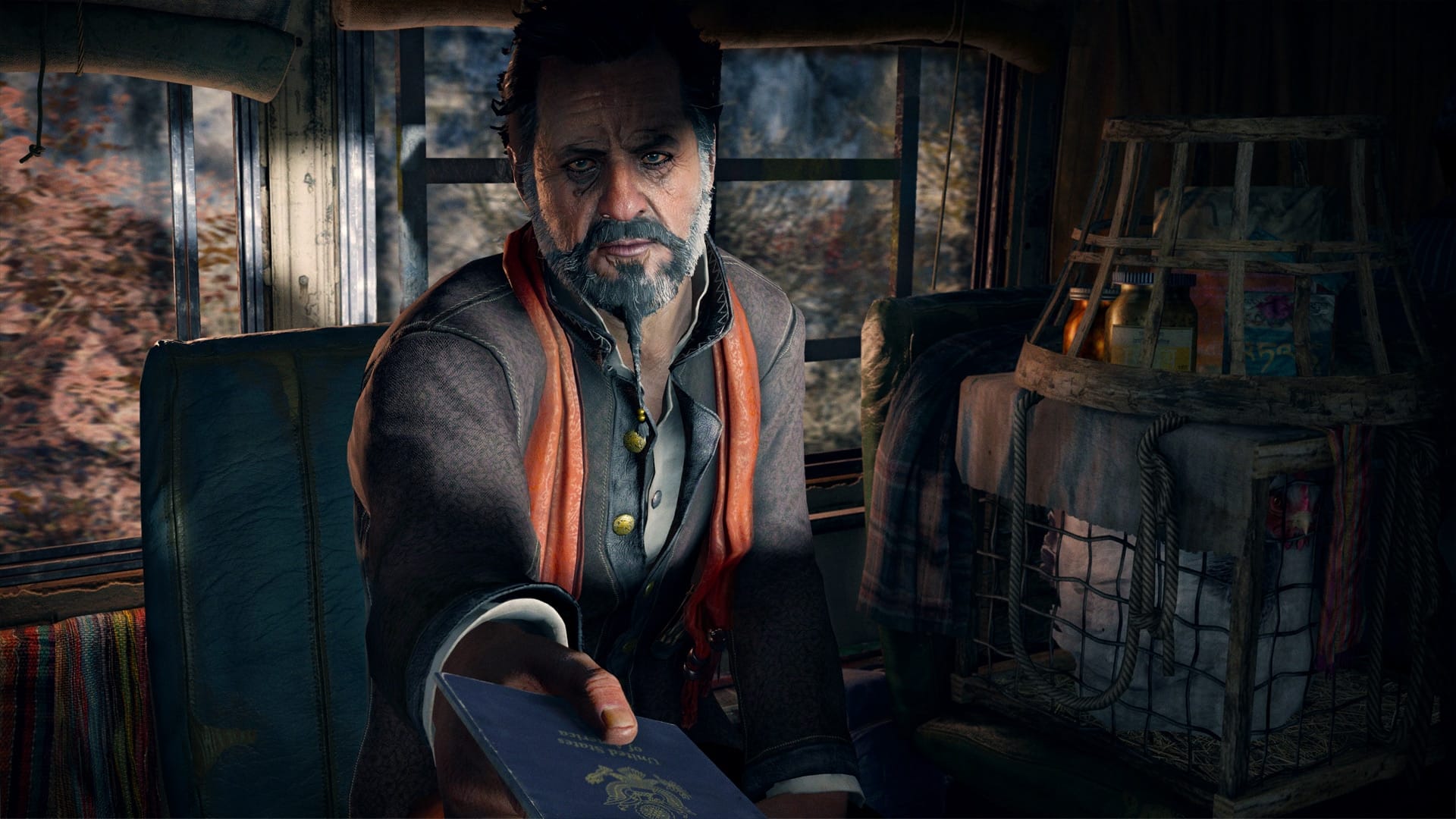
And there you have it. You can, of course, choose to kill him as he makes his escape — “You can have Kyrat, Ajay, but I’m keeping the helicopter!” — but if you let him go, he’s no longer a threat. It’s not quite a redemption, yet there’s a clear sense that you just freed Pagan from decades of misery as ruler of Kyrat. Which brings us back to your former cohorts, who are now keen to take that seat, unaware or unconcerned with your right to the throne.
You see, whichever of them you choose, you can talk to Sabal or Amita one more time as their regime starts to take hold. They’ll warn you to stay out of their way, being villainous and ominous, but then something fascinating happens. In every previous encounter, you couldn’t fire at them, obviously. Yet here, your crosshair doesn’t drop. Pagan himself noted that you were “half done,” and you know your former ally will become a rival — that is, if you intend to claim Kyrat. Or is it better to step aside and not interfere further? The choice is yours.
What I love about all this is that in every situation where you make Ajay’s choice, the game accounts for it. If you take the shot, fellow members of the Golden Path resistance group will turn into enemies. You don’t get a “game over” for breaking from the script or something. It’s nowhere near the gratuity of Far Cry 3’s “Go native and have ritual sex-death or save your whiny trustfund friends and kill your new native girlfriend” choice. If anything, Far Cry 4 expects you to put genuine forethought into these narrative decisions that’s deeply refreshing.
You might be wondering why I’m talking about narrative above all else if it’s the “perfect Ubisoft game” — but that’s because everything else works in concert. The drudgery of clearing outposts and towers is intentional as you’re doing a bunch of busywork you could’ve skipped if you’d waited at the start. The quirky sidequests are all bolstered by endearing characters, including Pagan Min’s former fashion designer who ends up being one of the most touching characters you meet. Eddie on the radio grows a bit stale with his jokes after a while, and the backpacking tourists with drug recipes outstay their welcome by even being present, but otherwise, everything feeds back into Ajay’s bewildering journey.
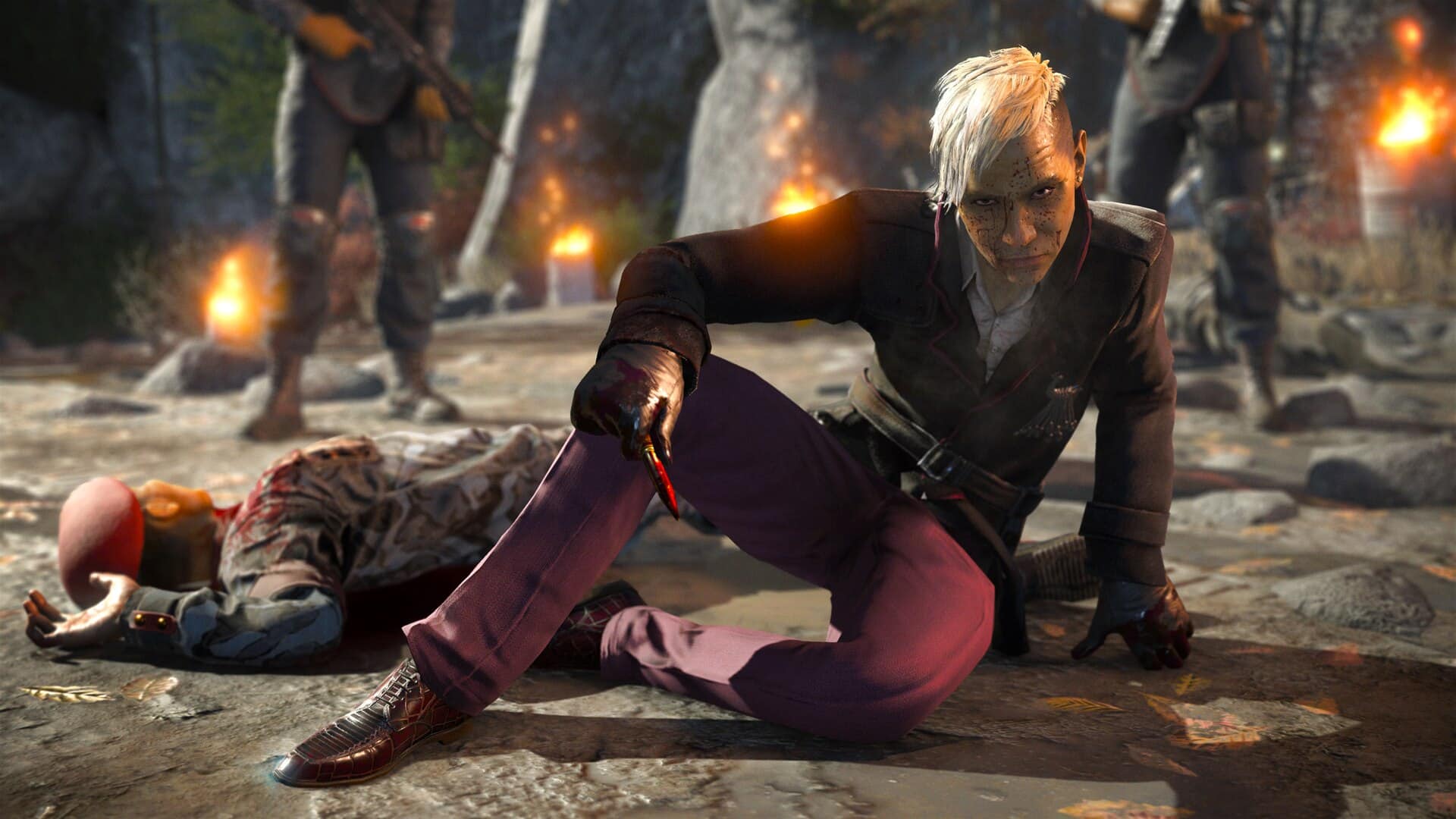
Ajay has a voice — he can be quite likable at times — and you feel the same highs and lows that he endures. There’s rarely a moment of dissonance, another welcome surprise from other Ubisoft games like Watch Dogs where the player and the protagonist might as well be separate personalities in the lead’s head. All the weird hijinks, guns-blazing combat, tense stealth, harrowing near-death experiences, political conspiracy, and weighty decisions feel tangible in Far Cry 4’s heightened reality. It’s not surrealist or pure power fantasy, but something more.
Ever since, it’s like every other Ubisoft game has been trying to capture that energy, and each has struggled. Even Far Cry 5, which tries to double down on the themes of Far Cry 4 in an American context, struggled considerably. Ubisoft has already achieved its ideal game within the parameters it keeps reaching for. We don’t need more games with these exact themes, but instead more games with the earnest sincerity of Far Cry 4.
That’s what Ubisoft used to be great at — cohesive, unified experiences with clear creative goals and brilliant player agency. While the recent BioWare-ification of Assassin’s Creed has been a surprising step, I just miss when it would put out games like Far Cry 4. In many ways, it helped redefine the brand beyond the exploitational elements of its predecessor, to say nothing of offering an open-world game with a thematic point to its sandbox of checklist objectives. Until the developers find their footing, at least we’ve got Far Cry 4.
Anyway, the holidays are in full swing! I tell you what — you get to unwrap one present early to get a peek: Let’s see here… *rustling paper noises* It’s from Colonel Campbell! It says, “I need scissors. 61!” Must be some kind of metaphor. *more rustling noises*
Ah, Metal Gear Survive. I’m sure no one will have any animosity towards that! *wink* Happy holidays!

